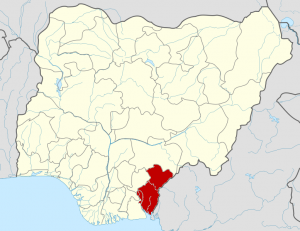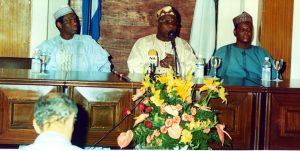We are here to watch the video below. That is because the video contains a major claim. But, before watching the video, there is a background to it. And here is the background.
Governor Ben Ayade of Cross Rivers State is bound to remain a curiosity in Nigerian politics. It is not every other day a professor achieves that in this polity, partly because the grooming of a professor is, for most times, contradicted by the space of politics in Nigeria.
But it is not only in Nigeria but a worldwide phenomenon traceable to the conception of politics and violence as an inseparable pair. That is what we get from the conception of politics as the art of the possible, given that what is possible can only be defined within space and time.
 Ben Ayade did not just stroll into power from professorship, he came in company of a professor as his deputy, except if he has fallen out with the first Deputy-Governor in his first term. That is the sort of thing that should have given the state a certain iconic image if it had been well played up.
Ben Ayade did not just stroll into power from professorship, he came in company of a professor as his deputy, except if he has fallen out with the first Deputy-Governor in his first term. That is the sort of thing that should have given the state a certain iconic image if it had been well played up.
The third element of curiosity about this professor – governor is the bad image he accumulated when the narratives linked him with despotic detention of Agba Jalingo, a journalist. By the time the governor told his story, many had already gone away with the initial narrative that the journalist was in detention because he wrote a story that angered the governor. In politics and in power, such narratives matter because the world does not always work the way we would have wanted it to work. As the folk wisdom poses it, “sometimes in life, one ends up going far beyond the place one never imagined going to”.
It is against this background that a Governor Ayade moment appears to be unfolding on account of a recent television appearance and what he is saying on responding to COVID-19. A professor who sent the video now trending on social media to Intervention accompanied it with the inscription that ended with “… but he is raising germane scientific issues”.
That was enough to trigger journalistic attention @ Intervention but for a previous experience that nearly went sour. The late Dr Jeremiah Abalaka had been talking a lot about having come up with a vaccine that could knock off HIV virus. A journalist who had morphed into the media assistant to Nigeria’s Minister for Foreign Affairs in the late 1990s went to him for a lengthy discussion. And forwarded his synthesis to the authorities for a pronouncement such as Nigeria and, by implication, Africa, might be up to something big as far as HIV/AIDS is concerned.
Yes, knowledge is not racial but who says then that one segment of humanity must remain endless consumers, even in realms it could improvise and put something on the table. Abalaka’s argument was so simple and fascinating: the only way to deal with virus is to take a weakened form of it, inject it back into the body as a way of neutralising the viral infection. That, he told the journalist turned adviser, has been the principle behind treatment of measles and every other viral infection and he saw nothing different in the case of HIV. In any case, he scoffed at the idea of declaring any disease as incurable. It was a fascinating encounter for a non-medical person.

Two of the three ministers that had to do with foreign affairs in Obasanjo’s first term. Sule Lamido on the right and Jerry Gana, the Hon Minister and the Minister for Integration, respectively at a press conference during the G77 & China in Cuba in 2002
Only age and wisdom saved the disaster that would have followed. The Minister for Foreign Affairs read the synthesis and asked a few more questions but decided that the idea would not go anywhere beyond the drawer in his study. Although he kept introducing his media aide as a resourceful fellow, no hint about a cure for HIV/AIDS from Nigeria came up until the diversity of flows in foreign policy pushed the synthesis out from the agenda entirely.
Imagine the disaster it would have been if it were otherwise because, up to his subsequent death, Dr. Abalaka’s claim of a vaccine that cured HIV/AIDS never got its demonstration by the standards acceptable to the concerned epistemic community in Nigeria. Since then, some people have learnt to be skeptical of all claims of cure for this or that by all manner of Nigerians, most of whom have no laboratories.
But, as mentioned above, the Professor who first drew Intervention’s attention to the video remarked about Ayade making germane scientific claims. Although this professor is not in the hard sciences, he is not a ‘Christmas Professor’ either but well heeled in scientific reasoning.
Secondly, he mentioned Ayade being a product of the University of Ibadan which is still Nigeria’s reference point in medical practice. Thirdly, he mentioned molecular biology being a domain of Microbiology and Biochemistry, fields which Ayade straddle.
What all these suggest is that Ayade is saying things worth exploring. Even if they are not wholly true, the nugget that can guide a breakthrough may be lurking in his claims. It costs nothing to engage him further.
Of course, there is already a challenge to Ayade by another gentleman who is also an authority on the issues of immunity and viral infection, (Intervention will publish this subsequently). But as is being argued, “Nigeria needs the debate of scientists of biological hue. Yes, this virus manifests as a medical condition but it is purely a matter for biologists to explore. Doctors, especially of Community/Public health saddled with treatment comes in after these scientists have done their work”
For Intervention, the tight rope between the experience with Abalaka and the fascinating promise of Governor Ayade’s television pronouncements compelled a headline that connected the two so that it is not a case of bending to any side too much this time.
Certainly, this would be such an original intervention if it turns out fine and nobody would be able to deny him “the Ayade moment in history”!. That though depends on how well Nigeria plays the game in the pharmaceutical world.
Now, may we listen to his television appearance once again!




























